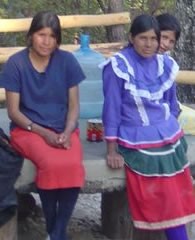Tepehuan, Suroeste in Mexico

Photo Source:
Tim W. Meyer
|
Send Joshua Project a map of this people group.
|
| People Name: | Tepehuan, Suroeste |
| Country: | Mexico |
| 10/40 Window: | No |
| Population: | 11,000 |
| World Population: | 11,000 |
| Primary Language: | Tepehuan, Southwestern |
| Primary Religion: | Christianity |
| Christian Adherents: | 60.00 % |
| Evangelicals: | 0.04 % |
| Scripture: | Translation Started |
| Ministry Resources: | No |
| Jesus Film: | No |
| Audio Recordings: | Yes |
| People Cluster: | Central American Indigenous, other |
| Affinity Bloc: | Latin-Caribbean Americans |
| Progress Level: |
|
Introduction / History
The indigenous Tepehua peoples live in the mountains of eastern Mexico, namely the Sierra Madre Oriental. They have four subgroups, one of which is called the Suroeste Tepehua. They speak one of the Nahuatl languages.
What Are Their Lives Like?
The Tepehua, Cora and Huichol peoples have similar lifestyles. All Tepehua peoples live in remote, scattered mountainous areas. Their homes are usually made of stone. Most are farmers who grow corn and beans. The Suroeste Tepehua raise chickens, turkeys and goats for meat. They hunt for wild game.
What Are Their Beliefs?
Like most indigenous peoples of Mexico, they are marginally Roman Catholic. They have the chance to hear the gospel truth, but most put their faith in ancient spirits and saints, like Saint Peter, etc. whom they believe can intercede for them before God.
What Are Their Needs?
The saints provide example of faithful living, but they do not have a magical connection with the true lord, Jesus Christ. The Suroeste Tepehua people need to put Christ first in their lives.
Prayer Points
Pray for Suroeste Tepehua fellowships to be Christ centered rather than saint and spirit centered.
Pray for spiritual hunger and a discernment that will keep them away from spiritual counterfeits.
Pray for the Holy Spirit to turn the Suroeste Tepehua church to make disciples who will make more disciples.
Pray there will soon come a day when the Suroeste Tepehua people will send loving workers to the unreached people groups in their country.